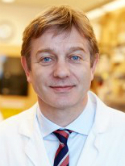NCI First International Workshop on The Biology, Prevention, and Treatment of Relapse After Allogeneic Hematopoietic Stem Cell Transplantation: Report from the Committee on the Biology Underlying Recurrence of Malignant Disease following Allogeneic HSCT: Graft-versus-tumor/leukemia reaction Journal Article
| Authors: | Miller, J. S.; Warren, E. H.; van den Brink, M. R. M.; Ritz, J.; Shlomchik, W. D.; Murphy, W. J.; Barrett, A. J.; Kolb, H. J.; Giralt, S.; Bishop, M. R.; Blazar, B. R.; Falkenburg, J. H. F. |
| Article Title: | NCI First International Workshop on The Biology, Prevention, and Treatment of Relapse After Allogeneic Hematopoietic Stem Cell Transplantation: Report from the Committee on the Biology Underlying Recurrence of Malignant Disease following Allogeneic HSCT: Graft-versus-tumor/leukemia reaction |
| Abstract: | The success of allogeneic hematopoietic stem cell transplantation (HSCT) depends on the infusion of benign stem cells as well as lymphocytes capable of participating in a graft-versus-tumor/leukemia (GVL) reaction. Clinical proof of concept is derived from studies showing increased relapse after the infusion of lymphocyte depleted hematopoietic grafts as well as the therapeutic efficacy of donor lymphocyte infusions without chemotherapy to treat relapse in some diseases. Despite this knowledge, relapse after allogeneic HSCT is common with rates approaching 40% in those with high-risk disease. In this review, we cover the basic biology and potential application to exploit adaptive T cell responses, minor histocompatibility antigens, contraction and suppression mechanisms that hinder immune responses, adaptive B cell responses and innate NK cell responses, all orchestrated in a GVL reaction. Optimal strategies to precisely balance immune responses to favor GVL without harmful graft-versus-host disease (GVHD) are needed to protect against relapse, treat persistent disease and improve disease-free survival after HSCT. © 2010 American Society for Blood and Marrow Transplantation. |
| Keywords: | transplantation, homologous; review; cancer recurrence; nonhuman; united states; disease free survival; drug megadose; antigen expression; t-lymphocytes; interleukin 2; cancer immunotherapy; low drug dose; interleukin 21; interleukin 7; genetic variability; relapse; recurrence; hematopoietic stem cell transplantation; b lymphocyte; b-lymphocytes; lymphocyte differentiation; immunological tolerance; antigen presentation; hematologic neoplasms; education; antibody response; graft versus host reaction; allogeneic hematopoietic stem cell transplantation; natural killer cell; adoptive transfer; killer cells, natural; cancer relapse; killer cell immunoglobulin like receptor; cytolysis; innate immunity; microenvironment; national cancer institute (u.s.); molecular biology; immune deficiency; adaptive immunity; graft versus leukemia effect; antigen presenting cell; t lymphocyte activation; interleukin 15; lymphocyte antibody; memory t lymphocyte; lymphocyte migration; workshop; graft-versus-host disease; graft-versus-leukemia reaction; hct; immune modulation; hla dp antigen; minor histocompatibility antigen; graft vs leukemia effect |
| Journal Title: | Biology of Blood and Marrow Transplantation |
| Volume: | 16 |
| Issue: | 5 |
| ISSN: | 1083-8791 |
| Publisher: | Elsevier Inc. |
| Date Published: | 2010-05-01 |
| Start Page: | 565 |
| End Page: | 586 |
| Language: | English |
| DOI: | 10.1016/j.bbmt.2010.02.005 |
| PUBMED: | 20152921 |
| PROVIDER: | scopus |
| PMCID: | PMC2858433 |
| DOI/URL: | |
| Notes: | --- - "Cited By (since 1996): 8" - "Export Date: 20 April 2011" - "CODEN: BBMTF" - "Source: Scopus" |




